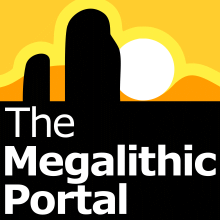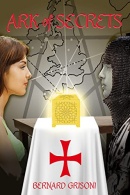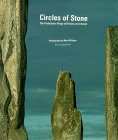<< News >> Clive Ruggles promoted to Professor of Archaeoastronomy
Submitted by David S. P. Dearborn on Tuesday, 18 June 2002 Page Views: 4030
DiscoveriesA Professor of Our Own by David S. P. Dearborn. On October 1st 2001, Clive Ruggles was promoted to a personal chair at Leicester University, and given the title of Professor of Archaeoastronomy.This is the culmination of a very unusual career path in which Clive has worked in Departments of Astrophysics, Archaeology, Statistics, Computer Science, Mathematics, Geography, Information Systems, and even Irish Studies. For a period he was also seconded to Academic Services to run cross-disciplinary projects in teaching and learning technology. Of course, it is his work in archaeoastronomy that will be familiar to readers of A&E News, and especially his books Astronomy and Society (1981), Megalithic Astronomy (1984), Records in Stone (1988), Archaeoastronomy in the 1990's (1993), Astronomies and Cultures (with Nicholas Saunders, 1993), and most recently Astronomy in Prehistoric Britain and Ireland, published by Yale University Press in May (UK) / August (US) of this year.
The full Professorship comes as a welcome recognition not only of Clive's contribution to archaeoastronomy but also of the status of archaeoastronomy itself. Working in an area of extreme polarization (Megalithic Astronomy), Clive's meticulous and careful research has promoted archaeoastronomy as a serious and valuable field of academic inquiry at the cross-over between several mainstream disciplines. Clive writes:
"Throughout my career I have been striving to place archaeoastronomy on firm theoretical and methodological foundations, so that ground-breaking work in the field is taken seriously by our academic peers in the very different mainstream disciplines to which it relates. I have felt for a long time (and I am not alone) that we archaeoastronomers need to be talking rather less to each other and far more to our anthropological, archaeological, historical, and astronomical colleagues. But they need to be persuaded to listen. The existence of an academic body, ISAAC (of which Clive is a founding member and officer - ed.), will help, but above all what we have to say has to make good sense and be relevant to them-and that means addressing questions that they will also see as important using methods that, from their own disciplinary perspective, they accept as sound."
In his lectures (available on the Web) Clive has characterized archaeoastronomy as "a field with academic work of high quality at one end but uncontrolled speculation bordering on lunacy at the other. " Without mincing words, he has criticized colleagues who became "surprisingly uncritical when moving outside their own disciplines." However such criticism is accompanied with thoughtful encouragement for the maintenance of rigorous academic standards by both word and example.
It is certainly true that academics construct 'brick walls' around their own disciplines, and the compartmentalized University system can easily encourage this. As an example of academic masonry (from Clives pedigree) Computer Scientist's see a world of mathematical theories and methods of software development. They tended to look down upon other computer users as mere hackers. On the other side, non-Computer Scientists see Computer Scientists as mere programmers whose ultimate purpose in life is to provide a support service for higher pursuits. Being interdisciplinary involves being aware of the non- superiority of one's own disciplinary view, seeing one's own deficiencies when stepping into a new field, and listening to what those already there have to tell us. Only then can we establish a working communication that will require and entice the practitioners of individual disciplines to listen and appreciate. When we have difficulty publishing, or worse yet, interesting academics in our results, we must look first to ourselves.
The majority of people doing ground-breaking work in archaeoastronomy and ethnoastronomy will have found themselves breaching disciplinary boundaries in earnest. All will have been through the process of confronting their own ignorance, and having to work fast to achieve an acceptable level of discourse with previously undiscovered sets of academic peers. This is difficult enough for an established academic, but consider the problems facing potential students. A student wishing to train seriously for a research career in archaeoastronomy needs a broad-based graduate program that gives them a balanced interdisciplinary view. The lack of suitable opportunities at graduate level must surely be a major concern faced by archaeoastronomy.
Clive's new position as Professor of Archaeoastronomy is a step towards answering this concern, as is the establishment of ISAAC. We must follow Clive's example of forging closer links with colleagues and with the academic establishment in the mainstream disciplines. The key to achieving secure ties in the longer term rests in producing a new generation of leading young researchers with truly interdisciplinary perspectives who really can converse meaningfully with anthropologists, historians, astronomers, or whatever. Even if they do not go on to become archaeoastronomers, such training provides a broad set of skills for life. There's the challenge. To see how we respond over the coming years, watch this space! Source: Center for Archaeoastronomy
Note: Not exactly new news but something important I missed. Well done Clive!






 We would like to know more about this location. Please feel free to add a brief description and any relevant information in your own language.
We would like to know more about this location. Please feel free to add a brief description and any relevant information in your own language. Wir möchten mehr über diese Stätte erfahren. Bitte zögern Sie nicht, eine kurze Beschreibung und relevante Informationen in Deutsch hinzuzufügen.
Wir möchten mehr über diese Stätte erfahren. Bitte zögern Sie nicht, eine kurze Beschreibung und relevante Informationen in Deutsch hinzuzufügen. Nous aimerions en savoir encore un peu sur les lieux. S'il vous plaît n'hesitez pas à ajouter une courte description et tous les renseignements pertinents dans votre propre langue.
Nous aimerions en savoir encore un peu sur les lieux. S'il vous plaît n'hesitez pas à ajouter une courte description et tous les renseignements pertinents dans votre propre langue. Quisieramos informarnos un poco más de las lugares. No dude en añadir una breve descripción y otros datos relevantes en su propio idioma.
Quisieramos informarnos un poco más de las lugares. No dude en añadir una breve descripción y otros datos relevantes en su propio idioma.